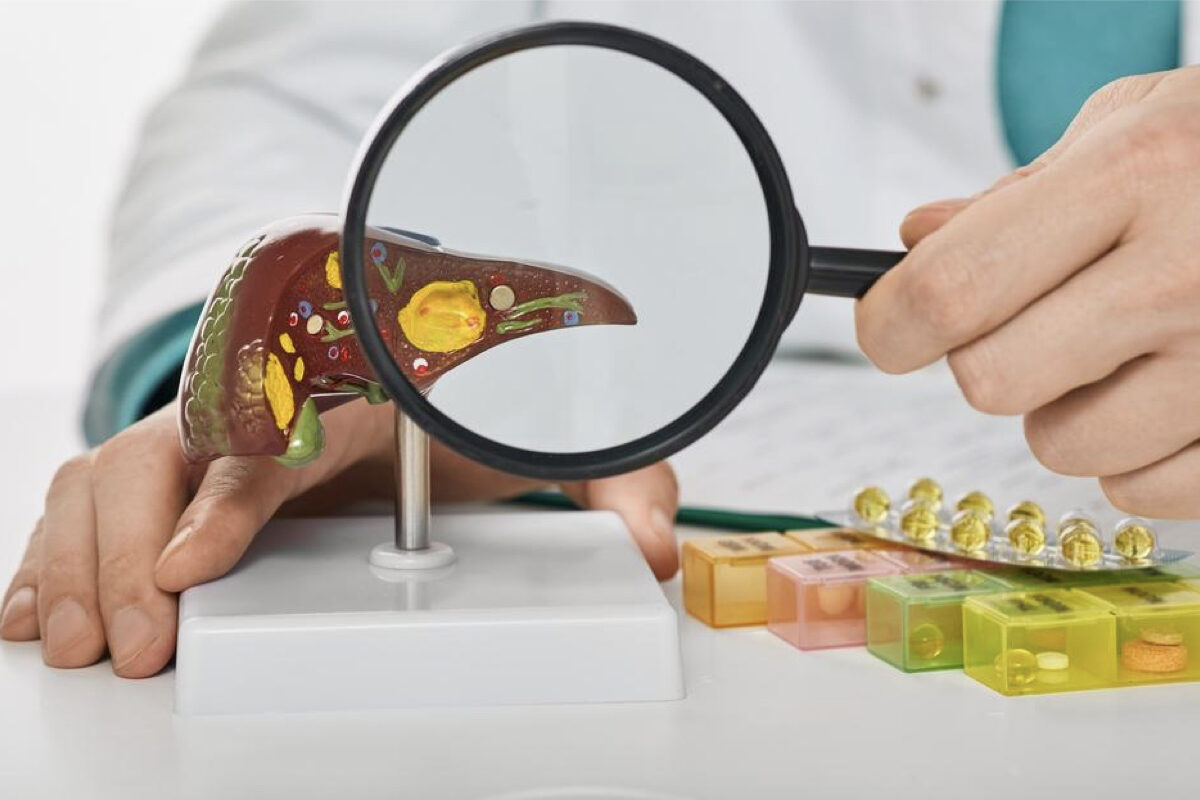


The liver is a vital organ that governs the body’s metabolism and is especially adept at clearing harmful substances. Liver cancer is a serious public health issue in the United States. Around 30,000 to 40,000 people in the United States are diagnosed with liver cancer yearly, with an annual death rate of about 30,000. Early detection is difficult, and when diagnosed, it is usually at an advanced stage, resulting in a high mortality rate.
Western medicine’s prime treatment methods typically include surgery, chemotherapy, and other similar methods. However, acupuncture, Chinese medicinal treatment, and other traditional Chinese medicine (TCM) approaches can be used in conjunction with adjuvant treatment. Moreover, lifestyle changes and adaptation can also help prevent liver cancer.
Liver cancer is a malignant tumor that originates in liver cells. It can occur anywhere within the liver and usually does not show obvious symptoms in its early stages. However, when cancerous cells grow and spread, we then feel the symptoms. These include the feeling of a lump or swelling in the abdomen, abdominal pain or discomfort, weight loss, loss of appetite, frailty or fatigue, and jaundice (yellowish skin and eyes).
Doctors begin with a physical examination, which includes looking for lumps in the abdomen or an enlarged spleen. The doctor will also review the patient’s medical history to see if there has been hepatitis, alcoholism, or long-term exposure to carcinogens.
Blood tests are done to check for normal liver function including levels of liver enzymes, hepatitis virus infection, and more.
Imaging tests can check the size, location, and number of tumors. Commonly used imaging tests include ultrasound, computed tomography (CT), magnetic resonance imaging (MRI), and positron emission tomography (PET).
Doctors may conduct histological tests to confirm the diagnosis if the imaging tests show anything suspicious. Histology usually includes a needle biopsy or surgical sampling, where doctors take a sample of liver tissue and examine it under a microscope in the laboratory.
Based on the results of the above examinations and evaluations, the doctor can determine whether it is liver cancer and, at the same time, evaluate the size, location, and spread of the tumor before deciding on the most suitable treatment plan.
Western medicine’s liver cancer treatment starts with data such as the patient’s bodily condition, tumor size, location, and spread of cancerous cells. Then, follow-up treatment options usually include surgery, radiation therapy, chemotherapy, and targeted therapy.
Surgical resection is the treatment of choice for early liver cancer. For people whose tumors are small and have not spread to other parts of the liver, surgery can eliminate the cancer cells by removing the tumor and its surrounding healthy tissue. Before surgery, doctors may also recommend chemotherapy or other treatments to help shrink the tumor.
Radiation therapy uses high-energy X-rays or other radiation to destroy tumor cells. It is usually employed to treat liver cancer that cannot be removed with surgery or if the tumor has returned after surgery. Radiation therapy may also relieve a patient’s symptoms, such as pain or other discomforts.
Chemotherapy uses specific drugs to kill cancer cells. It is usually employed to deal with large or already-spread liver cancer that cannot be removed with surgery. Chemotherapy may also be used before or after surgery to help shrink tumors or prevent tumors from returning.
Targeted therapy is a new type of treatment that inhibits or blocks the growth and spread of cancer cells by targeting specific molecules or proteins in the cancer cells. Targeted therapy is often used to treat unresectable large or spread liver tumors and has indications for specific molecules or proteins.
In addition to these treatments, doctors may also recommend adjuvant treatments such as pain management, nasogastric tube insertion, and targeted radiation therapy. During the treatment, doctors need to monitor the patient’s progress closely.
TCM’s liver cancer treatment is usually based on various TCM approaches like acupuncture, Chinese medicinal treatment, diet therapy, qigong, massage, etc. However, it should be noted that Chinese medicine treatment is not a substitute for Western medicine but is best used in conjunction with the latter.
Acupuncture is a form of TCM treatment that targets symptoms of the liver, such as pain, fatigue, and insomnia. In addition, acupuncture can stimulate the body’s ability to repair itself and relieve symptoms such as pain and stress.
TCM posits that the human body has a “meridian” system, a circulation network for qi (energy) movement. The internal organs are connected to various body parts through these meridians. There are different acupuncture points on the corresponding meridian path, and they have corresponding relations with various parts of the body.
A research review published in the Journal of Cancer in 2021 pointed out that acupuncture and electroacupuncture, two classic TCM treatments, are widely used to treat various diseases and have been proven beneficial to cancer patients. Acupuncture and electroacupuncture are used clinically to relieve cancer symptoms, reduce cancer treatment-related side effects, and relieve cancer pain.
Chinese medicinal herbs also have specific applications in the treatment of liver cancer. Commonly used herbs include Bupleurum, Scutellaria, Salvia, dandelion, and Prunella vulgaris. These medications can help relieve symptoms, regulate homeostasis, boost immunity, and more.
A study was published in the journal Liver International in 2015 after following 127,237 patients with liver cancer for an average of about five years. It found that compared with patients who did not use Chinese medicinal herbs, the risk of death in patients who used them was significantly reduced by 35 percent. The study also found that these Chinese medicines showed similar significant protective effects on various subgroups of chronic liver diseases. Reinforced Bupleurum chinense and peony formula powder and a combination decoction of Bupleurum chinense and cyperus were by far the most effective Chinese medicines to improve the survival rate of patients.
Liver cancer patients can also improve their condition by eating foods that help protect the liver, such as green leafy vegetables, fruits, whole grains, mushrooms, tofu, and the like. At the same time, avoiding high-fat, high-calorie, high-sugar, and high-protein foods is necessary.
Qigong and tuina (manipulation) massage can help patients relieve stress, improve blood circulation, promote body self-healing, etc. These treatments can relieve pain, fatigue, insomnia, and other symptoms of liver cancer patients, while also improving the patient’s overall immunity.
A 2002 research review published in the journal Integrative Cancer Therapies analyzed the results of more than 50 studies and found that cancer patients who practiced qigong on their own showed more significant improvement or higher survival rates than those who used traditional methods alone. In addition, in vitro studies have found that qigong emission inhibits cancer growth, while in vivo studies have found that the qigong treatment group significantly reduced tumor growth or prolonged the survival of cancer-bearing animals.
It should be noted that TCM treatment is not a treatment on its own but requires patients to receive comprehensive treatment through various other methods such as lifestyle changes, diet, exercise, and a doctor’s treatment. Therefore, patients should consult a doctor before receiving TCM treatment to ensure its safety and effectiveness.
To prevent liver cancer, one needs to pay attention to the following.
1. Avoid overeating and excessive drinking: Long-term excessive drinking damage the liver, leading to cirrhosis and liver cancer. Therefore, reducing or avoiding alcohol consumption can reduce the risk of liver cancer. At the same time, avoid overeating, consuming too much oil, salty food, etc., to reduce the burden on the liver.
2. Prevent viral hepatitis: Viral hepatitis is one of the leading causes of liver cancer, so hepatitis B vaccination can prevent hepatitis virus infection. Also, avoid unsanitary drug injections and blood transfusions to reduce the risk of hepatitis infection.
According to the clinical data analysis of the Hepatobiliary and Pancreatic Examination and Treatment Centre of Hong Kong Adventist Hospital-Tsuen Wan branch in 2022, more than 90 percent of liver cancer patients had hepatitis B virus in their bodies.
3. Avoid exposure to harmful substances: Occupational exposure to toxic substances, such as asbestos, vinyl chloride, organic solvents, and the li,ke may cause liver cancer. Therefore, pay special attention to occupational health and safety, and reduce the chance of exposure to these harmful substances.
4. Maintain a healthy lifestyle: Regular exercise, maintaining a healthy weight, and a good diet can help prevent liver cancer. Pay attention to a balanced and diversified diet, adequate protein, fat, carbohydrates, and vitamin intake, and appropriately increase the intake of vegetables and fruits.
In short, preventing liver cancer requires adjusting lifestyle and habits, regular inspection of liver health, timely detection, and treatment of liver diseases. Maintaining a healthy lifestyle can help reduce the risk of liver cancer.
*Some herbs mentioned in this article may be unfamiliar, but they are generally available in Asian supermarkets.
Note: Because different people have different physiques, it is recommended to consult your doctor or TCM experts.

